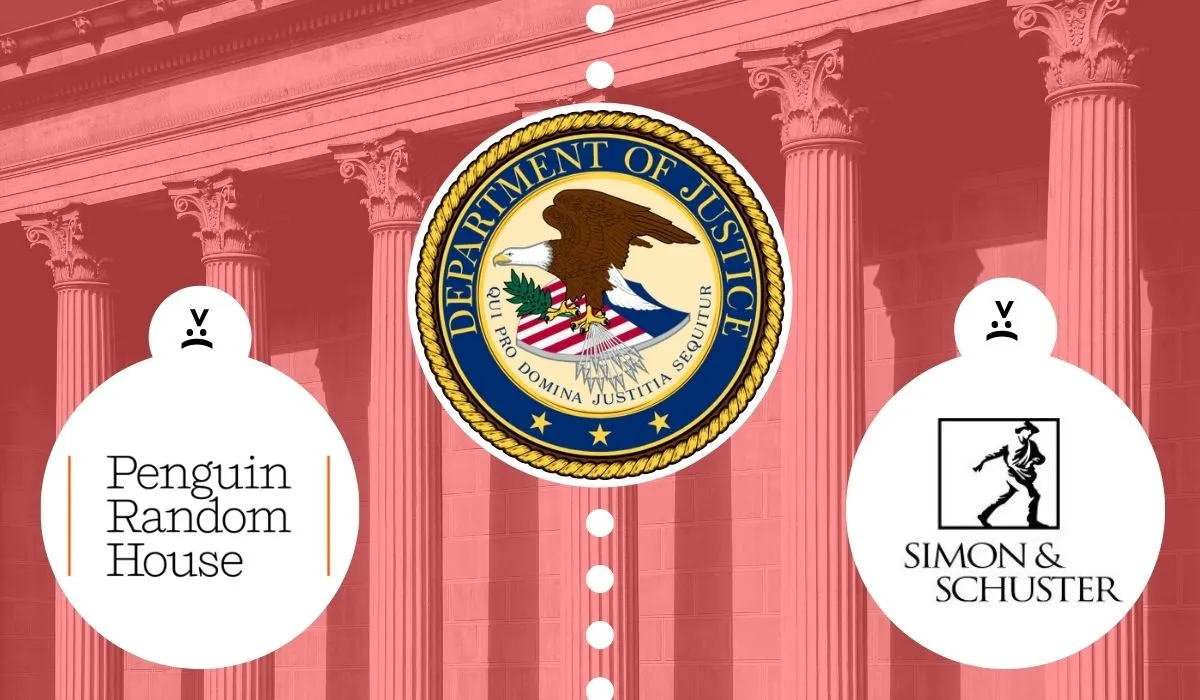After Penguin Random House announced its upcoming acquisition of Simon & Schuster in November, criticism came swiftly. Despite Penguin’s commitment to and past experience of maintaining competition after such a merger, and the framing of Amazon’s influence as a need to unite, The Authors Guild and others in publishing worried about anti-trust issues that would arise.
The influence of the Big Five (Penguin, Macmillan, Hachette, Harper Collins, and S&S) was already worrisome, but a behemoth (Penguin and S&S) versus three major publishers seems like it could only make things worse, so the U.S. Department of Justice (DOJ) got involved.
Part of the lawsuit from the DOJ reads: “If consummated, this merger would likely result in substantial harm to authors of anticipated top-selling books and ultimately, consumers. Penguin Random House would control close to half of the market for the acquisition of publishing rights to anticipated top-selling books. Penguin Random House’s next largest competitor would be less than half its size. Post-merger, the two largest publishers would collectively control more than two-thirds of this market, leaving hundreds of authors with fewer alternatives and less leverage.”
Externally, Penguin and S&S only announced that they would fight the lawsuit, and internally, both publishers send memos to employees addressing the suit. Weeks of tight-lipped silence later, Penguin is speaking up and firing back that the DOJ doesn’t have a case because the DOJ doesn’t know how publishing works.
OK, Penguin
While the DOJ has already made some errors in judgment, probably more fumbles are coming, but that doesn’t mean they don’t—or shouldn’t—have a case. When policymakers write anti-trust laws, and then the DOJ enforces them, they aren’t for specific industries because economists widely understand that monopolies are bad for competitive markets no matter the circumstances.
Penguin and S&S turning up their nose to the DOJ’s mistakes is a debate tactic but doesn’t change the actual numbers that much. For example, the DOJ said Penguin is the largest book publisher globally. This is false because technically, they are the third-largest in the world, but the largest trade publisher, as Publisher’s Weekly pointed out. However, that difference doesn’t change the overall situation.
This mistake could happen to anyone not fully in publishing. The opaque nature of publishing makes this information unfamiliar unless you are in specific roles or publishing-adjacent positions like librarians or bookstore employees. With a trial starting in late 2022, the DOJ will have plenty of time to correct their understanding and gather information from those (outside of consumers) most affected and knowledgeable, such as editors, authors (and their orgs), booksellers, and more.
The authors involved
Additionally, authors and others concerned in publishing have already spoken out about this, so it is not like the DOJ is doing something unexpected. Authors like Matt Stoller (who specializes in monopolies) tweeted how Penguin and S&S won’t bid against each other, making it harder for authors to get their worth in deals. Along with other writers’ groups, the Authors Guild called for the DOJ to get involved in a letter.
There’s been a lot of talk about prominent named authors’ feelings about all this (because that is who pushes units, and DOJ cited them). Still, honestly, I’m much more concerned about those who don’t often get recognized for their work and live at the intersection of multiple marginalizations. Their general (but not entire) silence is because even though they and readers like them could lose in the long run, speaking up against the monopolizing in publishing gives those in power another reason not to take your work seriously.
For example, authors have expressed frustrations in the recent past about being turned down because the publisher already has a(n) author of any given identity writing about “x” topic. Between imprints and significant publishers, people in marginalize groups could try to go somewhere else, but with consolidation, that is less likely to happen. This scenario doesn’t (appear to) happen as often, but this is what I mean about those not speaking up being the most vulnerable.
(via Publisher’s Weekly, image: Penguin Random House, Simon & Schuster, Creative Commons, and Alyssa Shotwell)
Want more stories like this? Become a subscriber and support the site!
—The Mary Sue has a strict comment policy that forbids, but is not limited to, personal insults toward anyone, hate speech, and trolling.—










Published: Dec 14, 2021 02:59 pm